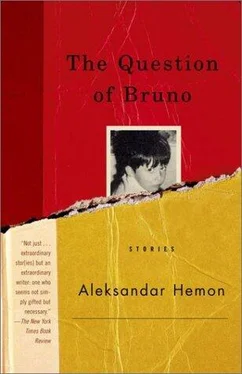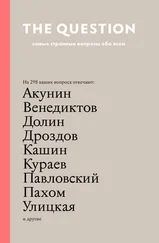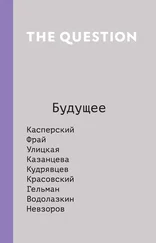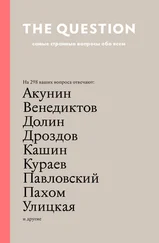Is the powder keg going to explode?
Yes.
Is he going to settle in the United States?
Probably not.
Has he ever heard of Stanley Kramer?
Guess Who’s Coming to Dinner?
Finally, Pronek toppled over his high wine glass, and then watched in panic, yet catatonic, the red tide spreading westward, toward the woman who had just come out of a painful, bitter divorce. She yelped and said: “Blood! I had a vision of blood last night! Ah!” She pressed her temples and stared at the asparagus corpses heaped in the middle of the table. She kept pressing her temples, as if trying to squeeze her eyes out. Pronek saw her long black nails bending backward and was afraid that they might break. She began sobbing, and everyone looked at one another, except Pronek, who looked at his supine wine glass. They sat in confounded silence; she wept, her crystal earrings rattling as her head quaked. The John Wesley Gluppson Prize winner then poured a little wine in her glass and said: “There, there now. It’s a Chardonnay!” whereupon she looked at him, smiled, and began wiping her tears with the tips of her fingers, whose nails were (to Pronek’s relief) unbroken, with the same vigor with which she wept. Pronek said: “I am very sorry.”
While in Los Angeles, Pronek met John Milius, because he wrote the script for Pronek’s favorite movie, Apocalypse Now. His office was in the building that Selznick constructed to stand in for Tara in Gone With the Wind— just the front part, in fact, because the building was only one room deep. Besides John Milius, who sat at his vast desk suckling on a cigar as long as a walking stick, there was a man who introduced himself as Reg Buttler. He was abundantly mustached and had on a pale-denim shirt, across whose chest an embroidered line zigzagged, like an EKG-line. He shook Pronek’s hand, and, additionally, heartily slapped his shoulder. There was a signed copy of the Apocalypse Now script (“From John to Reg”) on the table in front of him. Pronek was allotted a large glass of bourbon and a giant cigar.
“Cuban,” John Milius said. “The only good thing that communism ever produced.” Reg Buttler lit Pronek’s cigar, which kept wiggling, too large to handle, between his feeble fingers.
Then Reg Buttler put his right ankle on his left knee, and pulled the leg violently toward his pelvis, apparently trying to break his own hip. The sharp tip of Reg’s elaborately engraved cowboy boot was directly pointed at John Milius, and Pronek thought that if he had a secret weapon in that boot — something that would eject poisonous pellets, for instance — he could kill John Milius in an instant.
“Do you people in Sarajevo like Sam Peckinpah?” Milius asked.
“We do,” Pronek said.
“No one made blood so beautiful as the old Sam did,” Milius said.
“I know,” Pronek said.
“I didn’t know you could watch American movies there,” Reg Buttler said.
“We could.”
“So what’s gonna happen there?” Milius asked.
“I don’t know,” Pronek said.
“Thousands of years of hatred,” Reg Buttler said and shook his head compassionately. “I can’t understand a damn thing.”
Pronek didn’t know what to say.
“Hell, I’ll call General Schwarzkopf to see what we can do there. Maybe we can go there and kick some ass,” Milius said.
“Like we kicked Saddam’s ass,” said Reg Buttler. “Damn, that was fuckin’ good. We kicked that bastard’s ass.”
“General Schwarzkopf told me,” John Milius said, “that the Marines were the best. Those boys are the best.”
Pronek inhaled too much cigar smoke, so he abruptly coughed and spurted bourbon on the Apocalypse Now script, while a rivulet of snot ran down to his chin.
“War brings out the best and the worst in people,” Milius said. “And only the fittest survive.”
Pronek took out his hanky and wiped his nose, his chin, and the Apocalypse Now , respectively. Reg looked determinedly to the right, then to the left, clearly mulling over a profound thought.
“Do you want to stay in this country?” Milius asked Pronek.
“You should,” Reg Buttler said. “It’s a damn good country.”
“I don’t know,” Pronek said.
“I’ll call General Schwarzkopf and see what we can do about it. Listen, if you have nothing to do tomorrow, we can go out to the shooting range and raise some hell.”
“I’m there with ya!” Reg Buttler said.
But Pronek had a meeting that he couldn’t miss (which we know was not true) so he politely declined. Before he left, he had a picture taken in front of the building that used to act as Tara. There he is — our foreign friend — teeny with the house in the background, sturdy pillars all lined up behind, like cousins in a family picture, lawns glaring green. He is standing a foot away from Reg and Milius. Milius’s hand is resting on Reg’s shoulder, the two of them like Scarlett O’Hara and her pop, except there is no fake, painted, blood-red sunset, against which they could appear to be shadows, as the music reaches an orgasmic pitch.
Mud Miracle
Before it began circling like a hawk, waiting to bury its claws into the runway, the plane hit some turbulence, so orange juice leapt out of the trembling plastic cup, looked around and gleefully landed on Pronek’s beige pants. Chicago under snow looked like a frosted computer-chip board seen from high above, and — while our foreigner was being lowered — moving vehicles became discernible, little bytes being exchanged between the chips. There was a person with two yellow sticks waving at the plane, as if mesmerizing a dragon. Unbuckling the seat belt, which echoed cavernously all around the plane, Pronek realized that the juice stain had attained the subtle hue of urine.
Andrea was waiting for him at the exit, and as his co-passengers elbowed their way into the molasses of the airport crowd, she offered him her right cheek and her upper body attached to it, while keeping her lower body a couple of feet away, as if a contact between their pelvises would ignite a ferocious intercourse. She told him she was so happy to see him and asked him about his trip. Pronek pointed at the urine-orange stain and joked that his bladder was so small that urine just had to fight its way out, until it could breath freely, the wretched refuse.
Did she laugh? Indeed she did not.
They stood on the moving walkway, gliding through a dark tunnel with sinuous neon lights crawling all over the ceiling, and a synthetic female voice warbling: “Do not leave your baggage unattended!”
Desperate to be charming, Pronek said: “If thing that takes you up is escalator, would this be levelator?”
“Yeah, right,” Andrea said.
And now, why not, a quick step back into their common past:
Pronek met Andrea in the summer of ’91, in Ukraine. They had a lot of fun, flirting and witnessing the August ‘91 putsch. They held hands in front of the Ukrainian parliament when it declared independence, while everywhere around them people ruddy with patriotic excitement waved blue-and-yellow flags and demanded freedom and stuff like that. She had a Brit for a boyfriend, who wore a pinkish headband at all times and kept looking for a rave all over Kiev, but never found one. We know that he worked as a cameraman for the BBC, and on the day independence was declared, he was — God bless his hollow heart — very busy. So they walked to the Dnieper and bought a Red Army officer’s hat for a couple of dollars, which she wore thereafter. They ate a frisbeesized pizza, with carrot-and-beets topping. They watched the Dnieper gently flowing, with the scattered, starry glitter of dead-fish bellies. Pronek investigated the inside of her thighs, never getting over the wall of the panty-line, while the tips of their tongues clumsily collided in midair. In a fit of inexplicable giddiness, Pronek susurrously sang a Frank Sinatra song into her ear: “Eye praktis ehvree dai to faind sum klehvr lains to sai, too maik da meenin cum tfruh …”
Читать дальше












